By Ding Jo-Ann | The Nut Graph
“IS Umno its own worst enemy? Does it need to lose power before it can reform?”
These questions and more were posed to Members of Parliament (MPs) Khairy Jamaluddin, Tony Pua and Nurul Izzah Anwar at The Nut Graph’s recent forum, Found in Conversation: Creativity and Innovation in Politics.
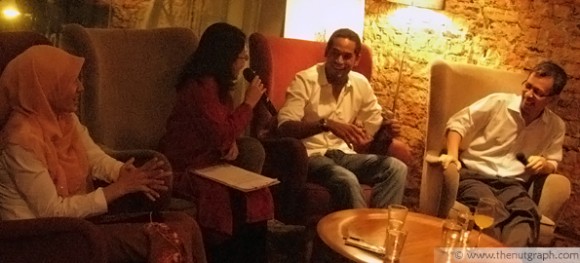 “Why does our prime minister have to spend so much time convincing those within his own party of what the public already want and believe?” asked audience member and Sisters in Islam co-founder Zainah Anwar.
“Why does our prime minister have to spend so much time convincing those within his own party of what the public already want and believe?” asked audience member and Sisters in Islam co-founder Zainah Anwar.
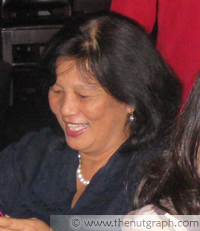 In response, Khairy, who is Umno Youth chief, said the party had enough of a wake-up call in the last general election and didn’t need to lose power to change. He said serious reforms were possible within Umno for it to move away from its old racial rhetoric and create a more inclusive platform.
In response, Khairy, who is Umno Youth chief, said the party had enough of a wake-up call in the last general election and didn’t need to lose power to change. He said serious reforms were possible within Umno for it to move away from its old racial rhetoric and create a more inclusive platform.
However, Khairy said it was important for Prime Minister Datuk Seri Najib Razak to also meet and listen to right wing groups such as Perkasa so that he could say he had taken all views into account.
“What is important is that the prime minister isn’t outflanked,” Khairy said. He said Najib needed to know that there was support for his reforms from within the party, adding that that was a role he, Khairy, could play.
“The prime minister [Datuk Seri Najib Razak] has the right sentiment and sensibilities,” Khairy told the over 80 people present at the 20 June 2010 event in Bangsar. “He needs people to tell him that it’s all right to [institute reforms] because there is support from within the party.”
Talking about change
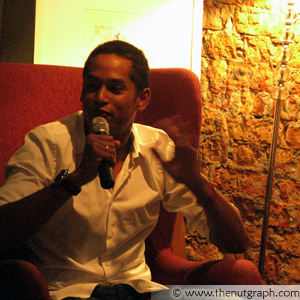 Although Umno may not be changing as fast as some would like, Khairy said it was important that people were still talking about change.
Although Umno may not be changing as fast as some would like, Khairy said it was important that people were still talking about change.
“We’ve been talking about changing Umno for many years. That’s ok to me, because we’re still talking about change. The moment we stop talking about change, that’s when I get worried,” the Rembau MP said.
Khairy said it was important to talk about changing Umno not just amongst “friendly” audiences who were open to the idea but also at the grassroots level. “It’s important to talk about [change] in the Umno Youth assembly, in Kelantan with the young people…I want to tell them it’s ok to talk about these things,” said Khairy.
He added that reform was gaining traction within the party and that its success would depend on how it was presented to the party faithful.
Khairy said one of the things that Umno needed to change was how local chieftains sometimes prevented good candidates from being fielded during elections. “Sometimes there are candidates who are popular within Umno, but not popular outside. Many leaders in Wanita and Puteri Umno are acceptable to the public, but because of a stranglehold within the party, they are not fielded.”
When The Nut Graph editor and forum host Jacqueline Ann Surin asked whether Umno could ever be headed by a woman president so that Malaysia could have a woman prime minister, Khairy said: “I wouldn’t rule it out, women can go straight to the supreme council.”
However, he admitted that Malaysia was not likely to see a woman Umno president in “our lifetime” because the party structure was stacked against women.
PR’s challenges
 Fellow panellist Pua, who is Petaling Jaya Utara MP and DAP national publicity secretary, also talked about changes within his party. In his response to audience member Marion D’Cruz’s request for politicians to actually change things and stop spouting mere rhetoric, Pua said there were genuine challenges involved in bringing about change.
Fellow panellist Pua, who is Petaling Jaya Utara MP and DAP national publicity secretary, also talked about changes within his party. In his response to audience member Marion D’Cruz’s request for politicians to actually change things and stop spouting mere rhetoric, Pua said there were genuine challenges involved in bringing about change.
“Before joining DAP, I used to write to [DAP advisor] Lim Kit Siang with all kinds of suggestions — recruit more Malay [Malaysian] members, all these things we talked about tonight,” said Pua. “After joining the party, I realised certain things. I went to the DAP national headquarters — it consists of two semi-detached houses joined together in a Petaling Jaya suburb. There were four to five staff there, including a telephonist. Everyone has to do everything there.”
Pua said he realised after joining DAP there were real constraints such as getting funds to hire talented, committed staff. “We can’t get around these challenges overnight,” said Pua. “We can’t change, for example, from a five-[person] team to a 25-person highly efficient bureaucracy overnight… We need time to organise, time to push for change.”
In the light of history, Pua said the two years after the March 2008 elections was a tiny fraction of time and that if change could be brought about within 10 years, he would consider that progress.
To Surin’s question about the viability of Pakatan Rakyat (PR) remaining a coalition, when previous opposition coalitions did not last, Pua said: “Absolutely, we’ll still be around for the next general election.”
He said the difference between the previous opposition coalitions and PR was that the previous coalitions did not get voted into government.
“Suddenly we have more important things than minor differences to pay attention to. We have to look at providing better facilities and amenities for people — these are the things that will get you re-elected next time round, not issues of conflict between two parties,” he said.
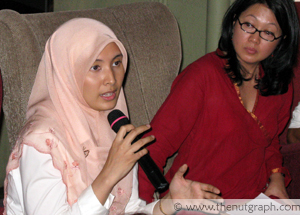 Parti Keadilan Rakyat (PKR)’s Nurul Izzah, who is also Lembah Pantai MP, said PR MPs face real challenges within Parliament because they are not in power. For example, she said PKR vice-president and Subang MP Sivarasa Rasiah has been thwarted from introducing a freedom of information bill in Parliament.
Parti Keadilan Rakyat (PKR)’s Nurul Izzah, who is also Lembah Pantai MP, said PR MPs face real challenges within Parliament because they are not in power. For example, she said PKR vice-president and Subang MP Sivarasa Rasiah has been thwarted from introducing a freedom of information bill in Parliament.
“At least in PR-led states, we have introduced some sort of legislation to reaffirm our commitment to reform,” she said, citing Selangor’s Select Committee for Competency, Accountability and Transparency or Selcat, and its plans to table a freedom of information bill for the state.
Most innovative practice?
In keeping with the forum’s theme, audience member Terry Netto asked all three MPs what was the most innovative practise their party had implemented.
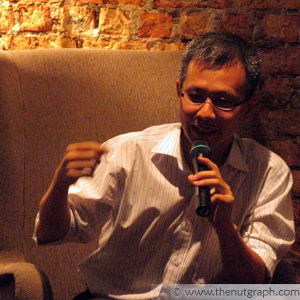 Lim’s blogging and twittering, was Pua’s reply. Pua said despite his seniority, Lim had really led DAP and put it at the forefront in terms of social media and networking.
Lim’s blogging and twittering, was Pua’s reply. Pua said despite his seniority, Lim had really led DAP and put it at the forefront in terms of social media and networking.
Khairy cited Umno’s constitutional amendments which now allows anyone to contest for the president and deputy president posts. Khairy said some Umno members had wanted other filters in place, such as being a supreme council member for three terms before being able to contest. “The PM rejected these suggestions,” said Khairy. “He said he didn’t need that kind of protection.”
Nurul Izzah spoke of Opposition Leader and father Datuk Seri Anwar Ibrahim’s idea to reform the New Economic Policy (NEP) to make it needs- instead of race-based. She also spoke of how the PKR youth wing members, unlike in other parties, consists of both men and women, and must be under 35.
“IS Umno its own worst enemy? Does it need to lose power before it can reform?”
These questions and more were posed to Members of Parliament (MPs) Khairy Jamaluddin, Tony Pua and Nurul Izzah Anwar at The Nut Graph’s recent forum, Found in Conversation: Creativity and Innovation in Politics.

Found in Conversation (l-r): Nurul Izzah, Surin, Khairy and Pua

Zainah Anwar
However, Khairy said it was important for Prime Minister Datuk Seri Najib Razak to also meet and listen to right wing groups such as Perkasa so that he could say he had taken all views into account.
“What is important is that the prime minister isn’t outflanked,” Khairy said. He said Najib needed to know that there was support for his reforms from within the party, adding that that was a role he, Khairy, could play.
“The prime minister [Datuk Seri Najib Razak] has the right sentiment and sensibilities,” Khairy told the over 80 people present at the 20 June 2010 event in Bangsar. “He needs people to tell him that it’s all right to [institute reforms] because there is support from within the party.”
Talking about change

Khairy Jamaluddin
“We’ve been talking about changing Umno for many years. That’s ok to me, because we’re still talking about change. The moment we stop talking about change, that’s when I get worried,” the Rembau MP said.
Khairy said it was important to talk about changing Umno not just amongst “friendly” audiences who were open to the idea but also at the grassroots level. “It’s important to talk about [change] in the Umno Youth assembly, in Kelantan with the young people…I want to tell them it’s ok to talk about these things,” said Khairy.
He added that reform was gaining traction within the party and that its success would depend on how it was presented to the party faithful.
Khairy said one of the things that Umno needed to change was how local chieftains sometimes prevented good candidates from being fielded during elections. “Sometimes there are candidates who are popular within Umno, but not popular outside. Many leaders in Wanita and Puteri Umno are acceptable to the public, but because of a stranglehold within the party, they are not fielded.”
When The Nut Graph editor and forum host Jacqueline Ann Surin asked whether Umno could ever be headed by a woman president so that Malaysia could have a woman prime minister, Khairy said: “I wouldn’t rule it out, women can go straight to the supreme council.”
However, he admitted that Malaysia was not likely to see a woman Umno president in “our lifetime” because the party structure was stacked against women.
PR’s challenges

Marion D'Cruz
“Before joining DAP, I used to write to [DAP advisor] Lim Kit Siang with all kinds of suggestions — recruit more Malay [Malaysian] members, all these things we talked about tonight,” said Pua. “After joining the party, I realised certain things. I went to the DAP national headquarters — it consists of two semi-detached houses joined together in a Petaling Jaya suburb. There were four to five staff there, including a telephonist. Everyone has to do everything there.”
Pua said he realised after joining DAP there were real constraints such as getting funds to hire talented, committed staff. “We can’t get around these challenges overnight,” said Pua. “We can’t change, for example, from a five-[person] team to a 25-person highly efficient bureaucracy overnight… We need time to organise, time to push for change.”
In the light of history, Pua said the two years after the March 2008 elections was a tiny fraction of time and that if change could be brought about within 10 years, he would consider that progress.
To Surin’s question about the viability of Pakatan Rakyat (PR) remaining a coalition, when previous opposition coalitions did not last, Pua said: “Absolutely, we’ll still be around for the next general election.”
He said the difference between the previous opposition coalitions and PR was that the previous coalitions did not get voted into government.
“Suddenly we have more important things than minor differences to pay attention to. We have to look at providing better facilities and amenities for people — these are the things that will get you re-elected next time round, not issues of conflict between two parties,” he said.

Nurul Izzah (left) and Surin
“At least in PR-led states, we have introduced some sort of legislation to reaffirm our commitment to reform,” she said, citing Selangor’s Select Committee for Competency, Accountability and Transparency or Selcat, and its plans to table a freedom of information bill for the state.
Most innovative practice?
In keeping with the forum’s theme, audience member Terry Netto asked all three MPs what was the most innovative practise their party had implemented.

Tony Pua
Khairy cited Umno’s constitutional amendments which now allows anyone to contest for the president and deputy president posts. Khairy said some Umno members had wanted other filters in place, such as being a supreme council member for three terms before being able to contest. “The PM rejected these suggestions,” said Khairy. “He said he didn’t need that kind of protection.”
Nurul Izzah spoke of Opposition Leader and father Datuk Seri Anwar Ibrahim’s idea to reform the New Economic Policy (NEP) to make it needs- instead of race-based. She also spoke of how the PKR youth wing members, unlike in other parties, consists of both men and women, and must be under 35.

No comments:
Post a Comment